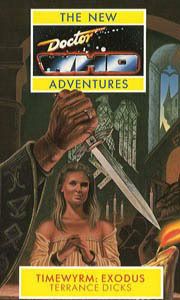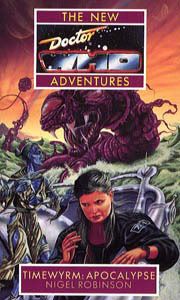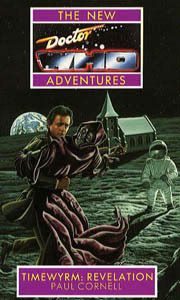The rest of Timewyrm: Genesys:
Unfortunately the book doesn't get any better as it goes on, with most of the characters never being more than broad caricatures and the story being a standard "evil alien wants to take over Earth's past" plot. In particular the alien Ishtar (prior to accidentally absorbing part of the Tardis and becoming the Timewyrm) is purely in the "You'll never defeat me! BWAH HAHA!" vein of villainy. Even the Doctor and Ace aren't quite right with it being very difficult to picture Sylvester McCoy or Sophie Aldred actually saying any of the lines that the characters are given. By the end the awful continuity references start to become insufferable with the Doctor for no apparently good reason taking on the personality of the Third Doctor to solve the climax, which is just stupid.

Timewyrm: Exodus by Terrance Dicks
In chasing the Timewyrm the Doctor and Ace find themselves in a version of London under Nazi control, and also into a much better book. Finally freed from having to novelise all of those Target Paperbacks throughout the 1980s Terrance Dicks crafts an engrossing tale of a Britain which has had its history changed. The increase in the quality from the previous book is notable with all of the characters, including thankfully the Doctor and Ace, being fully fleshed out and interesting. The first half of the book, set in the alternate 1951 is excellent, and is a real page turner. I did find though that once the Tardis heads further into the past to get to the root of the meddling things do go a bit down-hill. While the story is still very entertaining that bug-bear of overdone continuity from Genesys rears its head. While not as clunky as before having The War Lords from 1969's The War Games turn up does seem a bit unnecessary (it turns out Hitler was actually one of their experiments.). If the books were trying to capture a new audience does it really make sense to have the baddies turn out to be from a story told 22 years beforehand?
However Dicks' decision to keep the Timewyrm very much in the background (she tried to take over Hitler and got caught in his deranged mind) works very well since it avoids her cartoon villainy. Unfortunately the ending is spoilt by the Doctor again pulling a device out of his arse, sorry I mean out of the Tardis, in order to dispatch the Timewyrm. Still, for style of writing and quality of character Exodus is very good (and much better than the first novel).

Timewyrm: Apocalypse by Nigel Robinson
After defeating the War Lords and dispatching the Timewyrm from Hitler's mind the Doctor and Ace find themselves on an apparently idyllic alien world in the far future. And as with almost all idyllic worlds found in sci-fi stories there's a Horrible Truth(tm) to be discovered. Apocalypse is a book I remembered almost nothing about, and with good reason. There's nothing at all original to find in this novel. I suspect that Robinson must be a massive Patrick Troughton fan, since not only is the plot a mix of 60s stories The Macra Terror and The Krotons but the 2nd-Doctor (albeit a hologram) even pops up to give the 7th a few vague (and useless) warnings.
There's not really much more I can think to say about the book since really it's all so inconsequential. At the end the Timewyrm is again dispatched back to the Vortex (this time from the mind of the evil Grand Matriarch of the Panjistri) and the desperately dull Kirithon are left to their own destiny. It's not as bad as Genesys but just feels lazy.

Timewyrm: Revelation by Paul Cornell
Notice the cover? That's an actual scene from the book. It's the Doctor dancing with Death on the moon while being watched by an 8-year old astronaut and a sentient church.
Before things get *really* weird.
How did this book get published? The question isn't derogatory since Revelation is phenomenal. I'd go so far as to far as to say in its blowing apart the conventions of Doctor Who its influence can still be felt today (especially considering that the Paul Cornell has so far written 3 episodes of the new series). It's frankly amazing that 4 books into the series (and where things were kept very "safe" in the first 3) the publishers were brave enough to foist this on the public.
Revelation is filled with symbolism, allegory and philosophy which addresses reality, sentience, the import of memory and the existence of the soul. It's here that the New Adventures really takes off, with the Doctor becoming the Dark Manipulator of the universe constantly juggling ten different plans at any one time. Also the book does no end of wonders for Ace, as we truly get to know what makes her tick as she has her memory and personality slowly taken away by the Timewyrm as she races through the Doctor's mind (the section where she reasserts herself in the face of an alternative personality is incredible). And while the book is still heavy with continuity here it makes perfect sense as so much of the novel takes place within the Doctor's memories. While to the unfamiliar reader much may at first not make sense things are nicely explained and wrapped up by the end of the book (although there's still a few bits left to interpretation, as it should be).
And Cornell even manages to make The Timewyrm interesting.
Quite simply, amazing.
No comments:
Post a Comment